Herbal tea blends can boost your digestive wellness while providing the calming effects of aromatherapy. Ingredients like ginger and peppermint ease nausea and bloating, while chamomile and fennel help reduce inflammation and gas. Blending these herbs creates soothing drinks that promote relaxation and enhance your awareness of bodily needs. A simple cup can transform your tea time into a healing ritual. You can also experiment with DIY recipes to find your favorite combinations. With the right brewing techniques, you'll capture the maximum aroma and flavor, leading to an even more enjoyable experience. There's much more to explore beyond just the basics.
Benefits of Aromatherapy
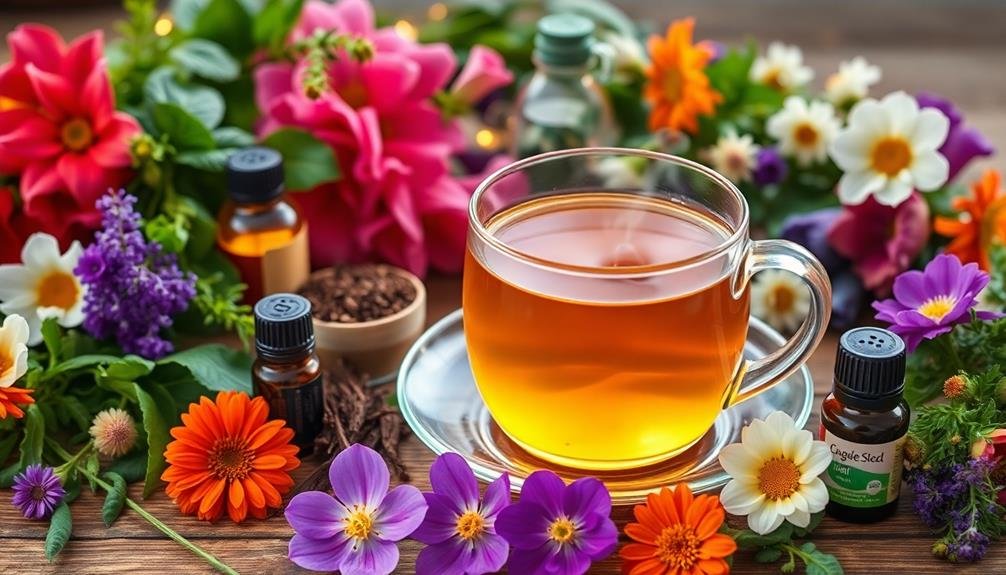
Exploring the benefits of aromatherapy can enhance your overall wellness, especially when it comes to digestive health. By incorporating essential oils into your routine, you'll find that they can support digestion in various ways. For instance, inhaling scents like peppermint or ginger can stimulate your senses, making you more aware of your body's needs. This awareness might encourage healthier eating habits, ultimately benefiting your digestive system.
When you practice aromatherapy, you can also create a calming environment. Stress often exacerbates digestive issues, and by using soothing scents, you can promote relaxation. Scents like lavender or chamomile can help reduce anxiety, allowing your body to focus on digestion without unnecessary tension.
Moreover, you can use aromatherapy in different forms, whether through diffusers, topical applications, or baths. Each method offers its unique advantages, giving you the flexibility to find what works best for you.
Through consistent use of aromatherapy, you'll likely notice a positive shift in your digestion, along with an overall sense of well-being. So, why not explore these aromatic options to support your digestive health? You'll appreciate the benefits they bring to your daily life.
Key Ingredients for Digestive Health
When it comes to digestive health, certain key ingredients can make a significant difference in how your body processes food. Ginger is a standout choice, known for its ability to soothe the stomach and ease nausea. It promotes digestion by increasing saliva and bile production, which helps break down food more effectively.
Peppermint is another excellent ingredient. Its menthol content relaxes the digestive tract and alleviates bloating and gas. If you often feel discomfort after meals, peppermint can be a game-changer.
Chamomile is revered for its calming properties, too. It not only soothes the stomach but also reduces inflammation, making it a great option for those with digestive disorders.
Fennel seeds can't be overlooked either. They help reduce gas and bloating while stimulating digestion. You might find them particularly useful after rich meals.
Lastly, dandelion root is packed with nutrients and supports liver health, which is essential for proper digestion.
Incorporating these key ingredients into your herbal tea blends can enhance your digestive wellness and contribute to overall comfort. So, why not give them a try? Your digestive system will thank you!
Popular Herbal Tea Blends
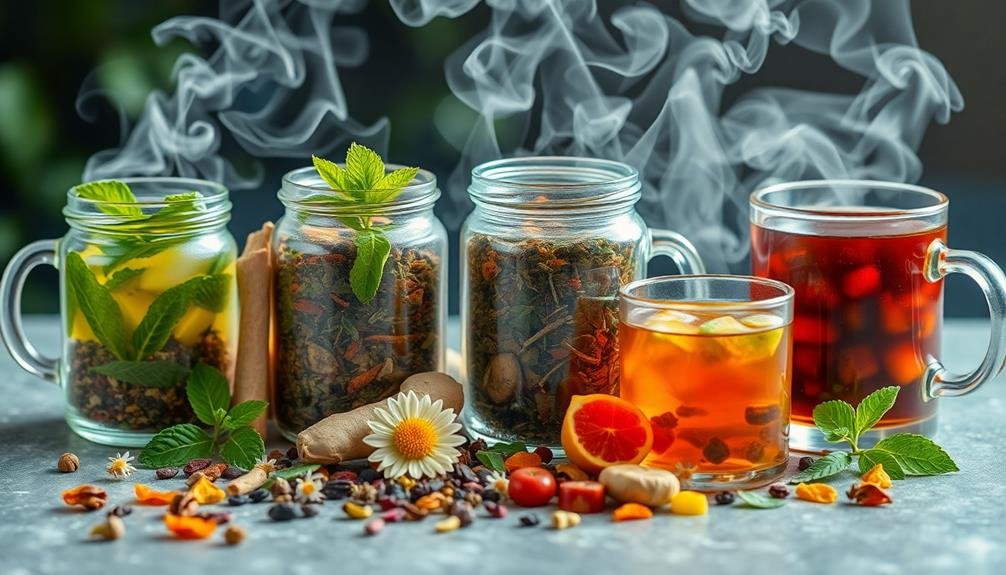
Herbal tea blends can be a delightful and effective way to incorporate those key ingredients for digestive health into your daily routine. One popular blend you might enjoy is peppermint and ginger. Peppermint helps soothe your stomach, while ginger can reduce nausea and promote digestion. Together, they create a revitalizing flavor that's easy to sip throughout the day.
Another blend worth trying is chamomile and fennel. Chamomile is renowned for its calming properties, which can help alleviate stress-related digestive issues. Fennel, on the other hand, aids in reducing bloating and gas. This combination not only tastes great but also relaxes your mind and body.
For a more robust option, consider a blend of dandelion root and burdock. Both herbs support liver function, which is essential for effective digestion. The earthy tones of this blend can be invigorating and grounding.
Lastly, a mix of lemon balm and licorice root offers a sweet, citrusy flavor while aiding digestion and reducing stomach cramps. These herbal tea blends can easily be incorporated into your day, enhancing your digestive wellness with every soothing sip.
DIY Herbal Tea Recipes
Creating your own herbal tea blends at home is a rewarding way to tailor flavors and health benefits to your taste. You can experiment with various herbs to create soothing and delicious combinations. Start with a base of chamomile or peppermint for a calming effect.
For digestive wellness, consider adding ginger for its anti-inflammatory properties, and fennel seeds to ease bloating. Combine one tablespoon of dried chamomile, one teaspoon of grated ginger, and half a teaspoon of fennel seeds.
If you prefer a brighter flavor, try a citrus twist. Mix equal parts of lemon verbena and dried orange peel with a touch of hibiscus for a revitalizing blend. This combination not only tastes great but can also help support digestion.
For a relaxing evening brew, blend lavender and lemon balm. Use one tablespoon of dried lavender and one tablespoon of lemon balm for a calming infusion that promotes restful sleep.
Feel free to adjust the quantities based on your preferences. Remember to label your blends with the ingredients and date, so you can recreate your favorites easily.
Enjoy the process, and savor each cup you create!
Brewing Techniques for Maximum Aroma
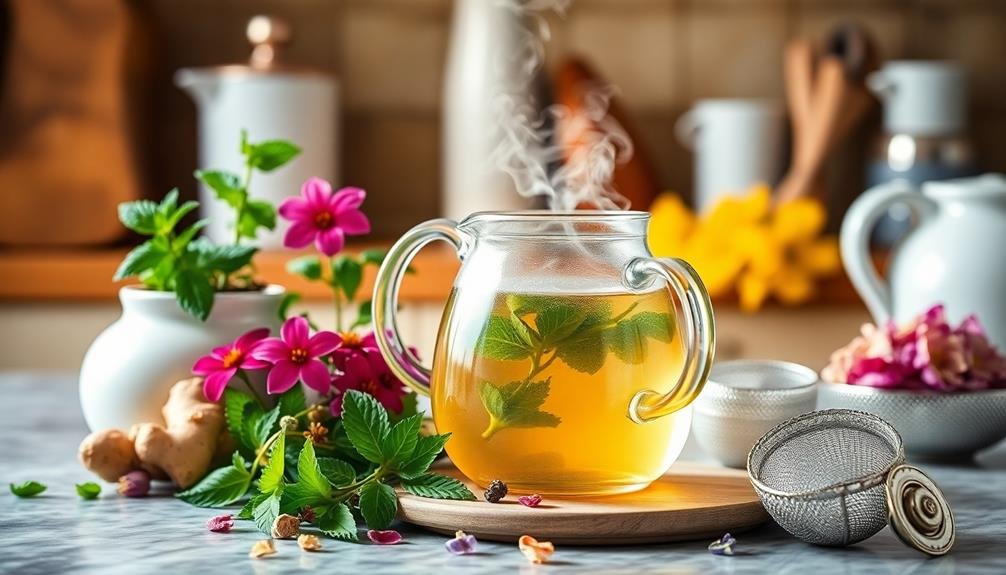
To brew the perfect cup of tea that maximizes aroma, focus on three key techniques: water temperature, steeping time, and quality ingredients. Each of these elements plays an essential role in releasing the full fragrance and flavor of your herbal blend.
- Water Temperature: Use water that's heated to the right temperature. Generally, herbal teas thrive at around 200°F (93°C) to 212°F (100°C). This helps extract the essential oils.
- Steeping Time: Pay attention to steeping time. Herbal teas typically need about 5 to 10 minutes. Experiment to find the sweet spot that delivers the best aroma without bitterness.
- Quality Ingredients: Invest in high-quality herbs and blends. Fresh ingredients have more essential oils, which means better aroma. Look for organic options whenever possible.
- Pre-Warm Your Teapot: Warm your teapot or cup with hot water before brewing. This simple step helps maintain the temperature, ensuring that the aroma is fully released into your tea.
Enhancing Your Aromatherapy Experience
To truly enhance your aromatherapy experience, you'll want to master scent pairing techniques that complement your herbal tea blends.
Understanding different brewing methods can also elevate the aroma, making your wellness routine more enjoyable.
Let's explore how these approaches can transform your tea time into a soothing ritual.
Scent Pairing Techniques
When it comes to enhancing your aromatherapy experience, pairing scents effectively can elevate your overall well-being. By choosing complementary aromas, you can create a harmonious blend that supports your digestive health and uplifts your mood.
Here are four scent pairing techniques to contemplate:
- Citrus & Mint: The bright notes of citrus combined with invigorating mint can energize and stimulate your senses while aiding digestion.
- Ginger & Chamomile: Spicy ginger mixed with calming chamomile creates a balance that soothes the stomach and promotes relaxation.
- Fennel & Anise: These two aromatic spices have a naturally sweet profile that not only enhances flavor but also aids digestion and alleviates bloating.
- Lavender & Lemon Balm: The floral touch of lavender paired with the lemony freshness of lemon balm can calm your mind while supporting digestive wellness.
Experiment with these combinations in your herbal teas or essential oils to find what resonates with you.
Brewing Methods Explained
Brewing herbal teas is a delightful way to enhance your aromatherapy experience and support digestive wellness. To get started, choose high-quality loose leaf herbs or tea bags that align with your wellness goals.
The right temperature and steeping time are essential. For most herbal blends, aim for water heated to about 200°F. This temperature guarantees the herbs release their beneficial compounds without damaging their delicate properties.
Once your water's ready, add your chosen herbs. If you're using loose leaf, a tea infuser can make this process easy. Steep the tea for about 5 to 10 minutes, depending on the blend. The longer you steep, the stronger the flavor and aroma will be.
As you brew, take a moment to inhale the rising steam; this boosts your aromatherapy experience.
After steeping, strain out the herbs and pour your tea into a favorite cup. Consider adding a touch of honey or lemon for an extra flavor boost.
Sip slowly, allowing the warmth and aroma to soothe both your body and mind. This simple ritual can transform your day and promote digestive wellness beautifully. Enjoy your personalized herbal tea journey!
Tips for Optimal Digestive Wellness
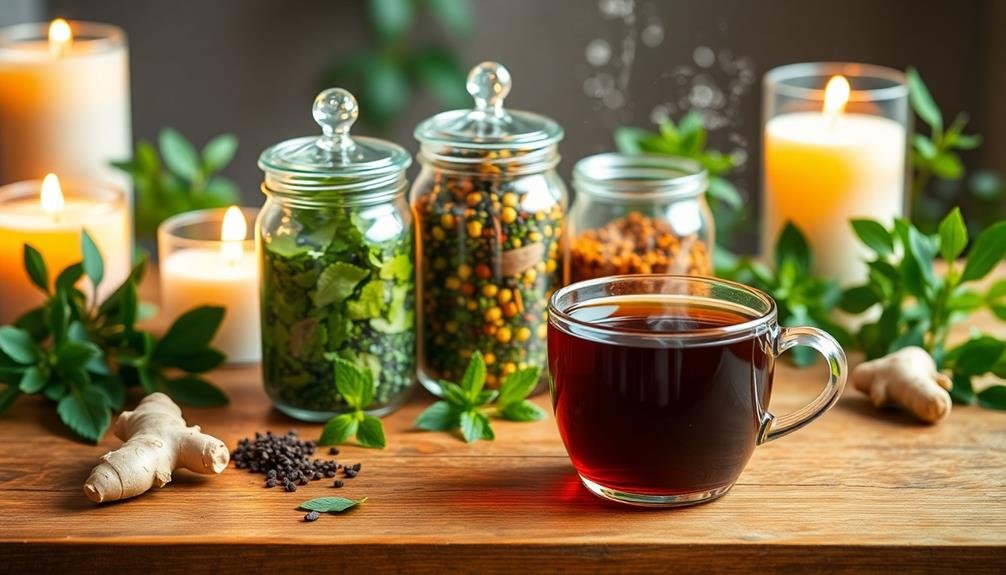
Achieving ideal digestive wellness involves a combination of mindful eating habits and incorporating beneficial herbal teas into your routine. By following these tips, you can support your digestive health effectively:
- Choose Whole Foods: Focus on fresh fruits, vegetables, whole grains, and lean proteins. These foods are packed with nutrients and fiber, which help promote healthy digestion.
- Stay Hydrated: Drink plenty of water throughout the day. Hydration is essential for digestion and helps prevent constipation.
- Practice Mindful Eating: Slow down during meals, chew your food thoroughly, and pay attention to your body's hunger cues. This practice can help you avoid overeating and improve digestion.
- Incorporate Digestive Herbal Teas: Sip on herbal teas like ginger, peppermint, or chamomile after meals. These teas can soothe your digestive tract and alleviate discomfort.
Frequently Asked Questions
Can Herbal Teas Replace Medication for Digestive Issues?
Herbal teas can complement your digestive health but shouldn't replace medication without consulting a healthcare professional. They may relieve mild symptoms, but serious issues require proper medical treatment to guarantee your well-being. Prioritize your health!
Are There Any Side Effects From Herbal Tea Blends?
Yes, there can be side effects from herbal tea blends. You might experience allergic reactions, digestive upset, or interactions with medications. It's best to consult a healthcare professional before trying new herbal teas.
How Often Can I Drink Herbal Tea for Digestion?
You can drink herbal tea for digestion daily, but listen to your body. Start with one to two cups and adjust based on how you feel. Hydration's key, so balance it with water too!
Can I Combine Different Herbal Tea Blends?
Absolutely, you can combine different herbal tea blends! Experimenting with flavors and benefits lets you tailor your experience. Just make certain the ingredients complement each other, and enjoy your personalized infusion for a delightful experience.
Is There a Best Time to Drink Herbal Tea for Digestion?
You'll find that drinking herbal tea after meals can aid digestion effectively. If you're looking for relief, try sipping before bed to soothe your stomach overnight. Timing's key for maximizing the benefits of your tea.
In Summary
Incorporating herbal tea blends into your routine can greatly enhance your digestive wellness while providing a delightful aromatherapy experience. By using key ingredients and brewing techniques, you can reveal the full potential of these soothing beverages. Don't forget to explore DIY recipes to find your perfect blend. With a few simple adjustments, you're on your way to enjoying the benefits of aromatherapy and achieving the best digestive health. Sip, savor, and embrace the journey to wellness!

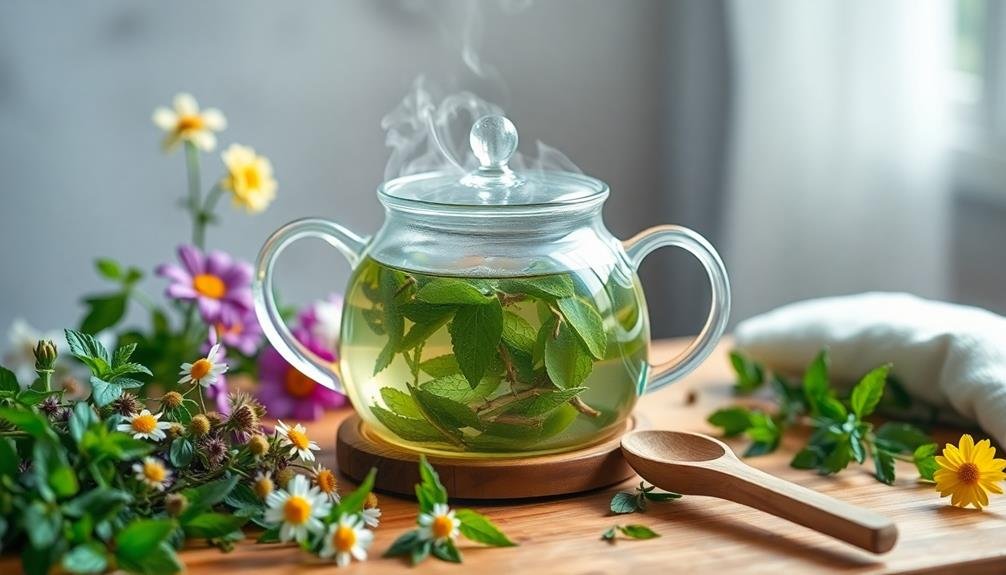
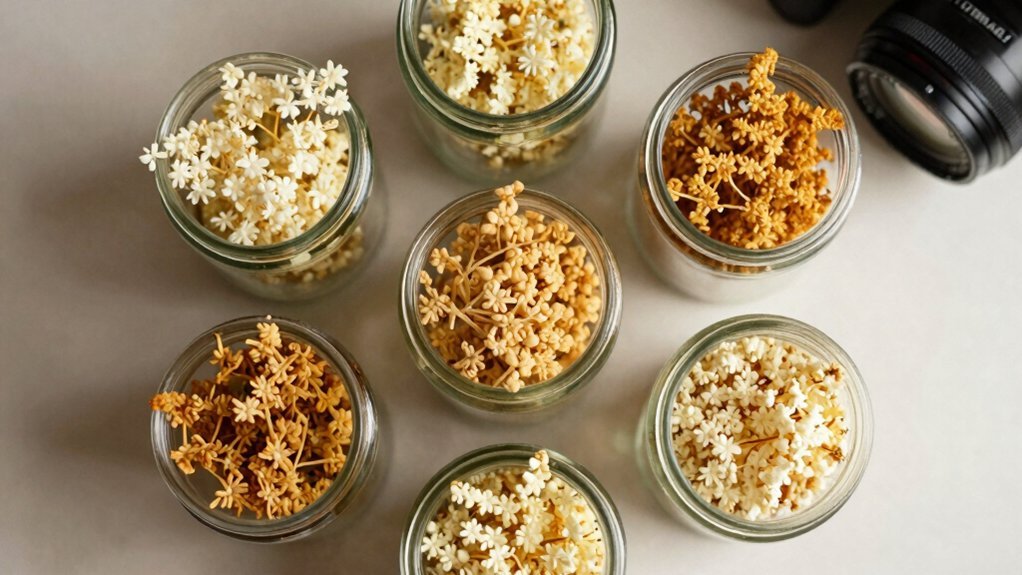

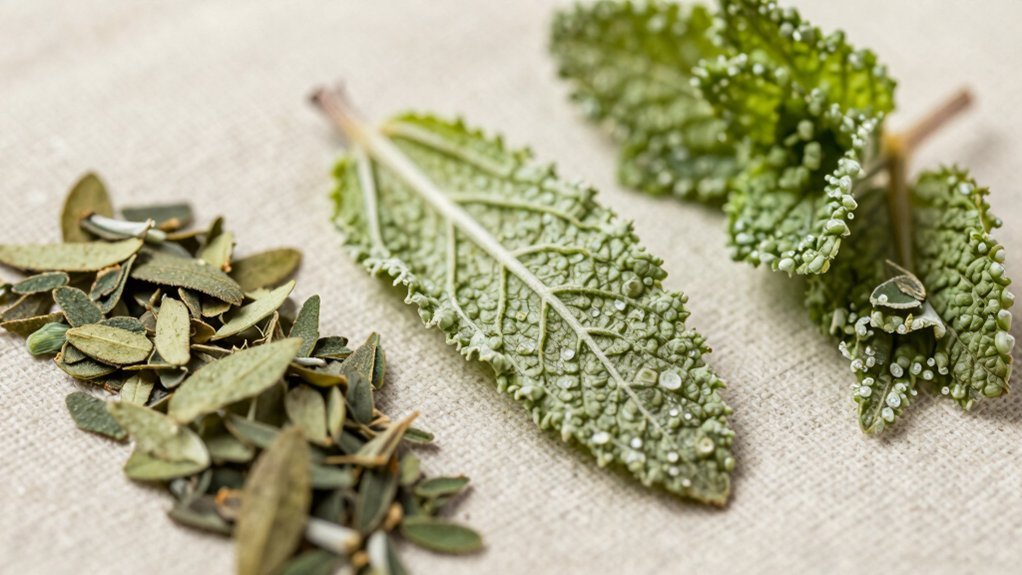
Leave a Reply